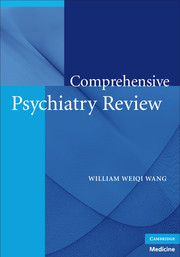Book contents
- Frontmatter
- Contents
- Introduction
- PART I INTELLECTUAL FOUNDATION OF PSYCHIATRY
- PART II EVALUATION AND MEASUREMENT
- PART III PSYCHIATRIC DISORDERS
- 10 Cognitive Disorders
- 11 Addictions: General Consideration
- 12 Addictions: Alcohol-Related Disorders
- 13 Addictions: Nonalcoholic Substance-Related Disorders
- 14 Psychotic Disorders
- 15 Mood Disorders
- 16 Anxiety Disorders
- 17 Somatoform Disorders
- 18 Dissociative Disorders
- 19 Sexual and Gender Identity Disorders
- 20 Eating Disorders and Weight Issues
- 21 Sleep Disorders
- 22 Factitious Disorders and Malingering
- 23 Personality Disorders
- 24 Child and Adolescent Psychiatric Disorders
- 25 Psychosomatic Disorders and Consultation-Liaison Psychiatry
- PART IV PSYCHIATRIC THERAPEUTICS
- PART V NEUROPSYCHIATRY AND RELEVANT NEUROLOGIC CONDITIONS
- PART VI SPECIAL TOPICS
- PART VII REVIEW QUESTIONS
- Bibliography
- Index
18 - Dissociative Disorders
from PART III - PSYCHIATRIC DISORDERS
Published online by Cambridge University Press: 18 January 2010
- Frontmatter
- Contents
- Introduction
- PART I INTELLECTUAL FOUNDATION OF PSYCHIATRY
- PART II EVALUATION AND MEASUREMENT
- PART III PSYCHIATRIC DISORDERS
- 10 Cognitive Disorders
- 11 Addictions: General Consideration
- 12 Addictions: Alcohol-Related Disorders
- 13 Addictions: Nonalcoholic Substance-Related Disorders
- 14 Psychotic Disorders
- 15 Mood Disorders
- 16 Anxiety Disorders
- 17 Somatoform Disorders
- 18 Dissociative Disorders
- 19 Sexual and Gender Identity Disorders
- 20 Eating Disorders and Weight Issues
- 21 Sleep Disorders
- 22 Factitious Disorders and Malingering
- 23 Personality Disorders
- 24 Child and Adolescent Psychiatric Disorders
- 25 Psychosomatic Disorders and Consultation-Liaison Psychiatry
- PART IV PSYCHIATRIC THERAPEUTICS
- PART V NEUROPSYCHIATRY AND RELEVANT NEUROLOGIC CONDITIONS
- PART VI SPECIAL TOPICS
- PART VII REVIEW QUESTIONS
- Bibliography
- Index
Summary
Dissociation is one of the most controversial, yet poorly understood, conditions in psychiatry.
Dissociation refers to the disruption (or “split,” in Pierre Janet's word) of the usually integrated consciousness. The symptoms of dissociation have been recorded from the time of antiquity. Many historical cases of spirit or demon possession seemed very much like dissociative disorders in modern eyes. In a mild level of severity, many people can consciously experience brief derealization and depersonalization. Severe dissociative symptoms are usually unconscious and pathological. Among the conditions with dissociation, the most dramatic is dissociative identity disorder, formerly termed multiple personality disorder. The claim that multiple minds can exist within one body had faced challenges from scientific researches due to short of empirical data. Rare in reality, the theatrical inlay of multiple personality disorder, along with other dissociative disorders, attracted waxing and waning public enthusiasm.
Over the past century, surmounting volume of literature has been published in the study of dissociative disorders. However, little conclusion was drawn from well-designed, controlled studies. Historically, dissociation was considered to be part of hysteria (somatoform disorders in DSM nomenclature) due to its lack of physical findings. In recent years, formation of dissociation has been attributed to traumatic experience in childhood. The theory of dissociation being a posttraumatic spectrum disorder has gained some acceptance. There are also neurobiological changes found in dissociative disorders.
DSM-IV-TR allows five diagnoses in the category of dissociative disorders
▶ Dissociative amnesia
▶ Depersonalization disorder
▶ Dissociative fugue
▶ Dissociative identity disorder
▶ Dissociative disorder not otherwise specified (NOS)
- Type
- Chapter
- Information
- Comprehensive Psychiatry Review , pp. 131 - 134Publisher: Cambridge University PressPrint publication year: 2009



